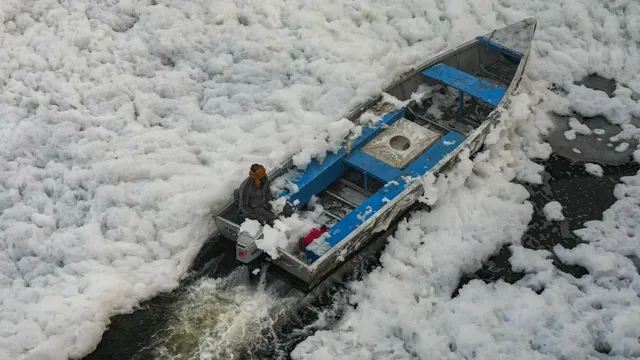- By Priyanka Koul
- Sat, 22 Nov 2025 05:16 PM (IST)
- Source:JND
The Delhi High Court, on Saturday, set up a three-member committee to expedite action on redevelopment plans for industrial areas and to ensure the proper treatment of wastewater flowing into the Yamuna River. The Court described the state of pollution control efforts for the Yamuna as a “shocking state of affairs."
The newly formed panel will include officials from the Delhi State Industrial and Infrastructure Development Corporation (DSIIDC), the Municipal Corporation of Delhi (MCD), and the Delhi Development Authority (DDA).
A Division Bench comprising Justice Prathiba M. Singh and Justice Manmeet Pritam Singh expressed strong disapproval over the delays highlighted in status reports filed by the DSIIDC, Delhi Pollution Control Committee (DPCC), and Delhi Jal Board (DJB) regarding the Yamuna river.
The Court also noted that, despite a cabinet decision taken in 2023, DSIIDC had only submitted its reports in 2025.
“The Government is bogged down by bureaucrats, the Court is also getting bogged down by them," the Bench remarked, warning, “We will just say, wind up DSIIDC if this is how it will work."
The judges observed that none of the redevelopment plans had been finalised, and that Rs 2.5 crore earmarked for project work had still not been disbursed.
Also Read: Shravasti Voter Drive: BLOs To get Certificates, Hotel Meals And Safari Tours For Fast Work
“In all these 27 areas, there is no treatment happening, that is why there is so much pollution. This is shocking," the Court said.
In an effort to resolve the issue, the Bench directed the DSIIDC to release the withheld Rs 2.5 crore to the MCD within two weeks. Justice Singh rebuked the authorities, saying, “Look at what you are doing, for this 2 crores, look at the 3 crore people suffering from this air and water."
The Court further instructed that all layout plans submitted by these agencies be jointly examined by DSIIDC, MCD, and DDA. The newly constituted three-member committee will meet to review the plans, secure necessary approvals, and submit a consolidated report.
“Citizens are struggling," Justice Singh remarked, stressing the need for stringent judicial oversight to underscore the seriousness of the issue.
Also Read: CJI Gavai's Tenure Saw Appointments Of 11 Judges from OBCs, 10 From SCs
Pointing to significant gaps in wastewater management, the Court noted that treated water was being diverted back into sewage lines and ultimately into the Yamuna, rather than being used for parks and lawns.
The Bench has also directed the DJB to file a detailed report on the following:
1. The steps required to augment the existing sewage treatment plants (STPs);
2. Measures to maintain water quality in functional STPs and address any deficiencies;
3. The status and challenges in the installation of planned STPs.

